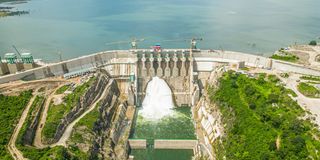Another 235 MW fed into Tanzania’s national grid from Julius Nyerere Hydropower Plant

What you need to know:
- The injected electricity from turbine eight brings the total power generated by JNHPP to 470 megawatts, thus resulting in the country’s power excess of 70 megawatts.
Dar es Salaam. The Deputy Prime Minister and the Energy Minister, Dr Doto Biteko, has said another 235 megawatts of electricity from the Julius Nyerere Hydropower Plant Project (JNHPP) have been fed into the national grid.
In a statement availed to The Citizen on Friday, June 14, 2024, Dr Biteko confirmed that the megawatts had been fed into the national grid following the commencing operation of turbine number eight.
On February 22, 2024, the first 235 megawatts from the JNHPP that can generate 2,115 megawatts were added to the national grid, providing a huge relief to the country’s access to reliable electricity.
The injected electricity from turbine eight brings the total power generated by JNHPP to 470 megawatts, thus resulting in the country’s power excess of 70 megawatts.
Drought and maintenance issues caused shortages in the national grid, forcing Tanzania to ration electricity since September last year.
Highlighting the performance of electricity, natural gas, and fuel for the years 2022–2023 in Dodoma, Dr Biteko said, “A total of 470 megawatts generated by JNHPP have already been added to the national grid.”
He commended the private sector for its outstanding job in the oil, gas, and electricity subsectors, urging it to further improve the energy sector.
The docket’s Permanent Secretary, Mr Felchesmi Mramba, said the recently injected megawatts show that the energy sector has made significant progress in many areas, including reliable access to electricity, and the availability and distribution of fuel.
He said the World Bank's report for Third World countries shows that Tanzania is doing better in the energy sector among developing countries and the African continent in general.
“This is the result of the effective government’s management as rural electrification and the JNHPP are the areas that have given the country significant scores,” he said.
"The World Bank has approved $300 million (Sh780 billion) to develop the Tanzania energy sector," he said.
Tabling the energy sector performance report, the Energy and Water Utility Regulatory Authority (Ewura) director general, Dr James Andilile, said the sector continues to improve, including ongoing investment in infrastructure.
He said investment in electricity has increased production, transportation, and distribution and reduced power loss.
According to him, the number of electricity customers has increased from 3.8 million in 2021/22 to 4.4 million in 2022/2023.
However, he said the delayed completion of infrastructure projects for reliable and sustainable investment remains a challenge.




